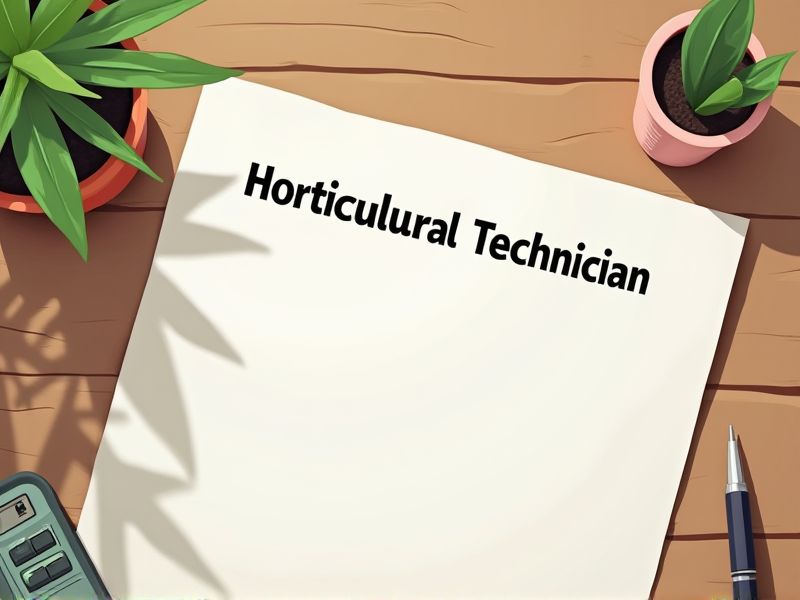
Horticultural Technicians work with plants, requiring a solid understanding of plant biology and best practices for fostering plant health. Certifications validate these expert skills and knowledge, ensuring that technicians are equipped to handle complex tasks effectively. Certain certifications also enhance career prospects and professional credibility in the competitive horticulture industry. Here are some crucial certifications you might need as a Horticultural Technician.
Certified Horticulturist (CH)
A Certified Horticulturist (CH) brings specialized knowledge and credibility, ensuring horticultural practices align with industry standards. Their expertise reduces errors in plant selection and maintenance, leading to healthier, more sustainable landscapes. Employing a CH can increase consumer trust and business reputation, as clients value professional certification. Horticultural Technicians without this credential may lack updated methods and innovations in the field, limiting effectiveness.
Pesticide Applicator Certification
Pesticide applicator certification ensures horticultural technicians have the necessary knowledge and skills to apply pesticides safely, minimizing potential harm to humans and the environment. Proper certification guards against improper pesticide usage, which could lead to contamination of water sources and the ecosystem. Certified technicians are required to stay updated on regulations and product knowledge, reducing liability for employers and fostering consumer confidence. Informed application practices contribute to sustainable horticulture, maintaining plant health without compromising safety standards.
Integrated Pest Management (IPM) Certification
Integrated Pest Management (IPM) Certification equips horticultural technicians with the skills to manage pest issues effectively, reducing reliance on chemical pesticides, which leads to less environmental damage. Certification validates a technician's competence in using diverse methods, such as biological controls, enhancing plant and ecosystem health. By holding IPM certification, technicians assure employers and clients of their commitment to sustainability and safe practices. Awareness in implementing IPM strategies results in decreased agricultural losses and increased crop quality.
Certified Nursery Professional (CNP)
Certified Nursery Professionals (CNP) possess specialized knowledge that ensures the optimal health and growth of plants, which is crucial for Horticultural Technicians. The certification process equips them with advanced skills in diagnosing plant diseases and pest management, enhancing the overall efficacy of horticultural practices. With CNPs, nurseries can maintain industry standards and implement sustainable practices effectively, aligning with environmental regulations. As consumer expectations for quality and sustainability rise, CNP credentials assure clients of professional expertise and reliable horticultural service.
Greenhouse Management Certification
Greenhouse Management Certification equips horticultural technicians with specialized knowledge to optimize plant health and productivity, enhancing their professional competency. By learning efficient resource management, technicians can significantly reduce operational costs and environmental impact, benefiting both business and sustainability goals. Certification often increases job opportunities and career advancement as employers prioritize well-trained staff to meet industry standards. Proper certification ensures adherence to safety protocols, minimizing risks associated with greenhouse operations.
Soil Science Certification
Soil Science Certification is needed for a Horticultural Technician because it provides a deeper understanding of soil properties that directly affect plant growth and health. This certification ensures that technicians can make informed decisions regarding soil management, which impacts crop yield and quality. Knowledge of soil science enables precise diagnosis of soil-related issues, leading to effective solutions. Certification enhances credibility and demonstrates a commitment to excellence in horticultural practices.
Plant Propagation Specialist Certification
A Plant Propagation Specialist Certification equips horticultural technicians with specialized knowledge in plant breeding and cloning techniques, enhancing their ability to maintain and improve plant health. This certification often leads to higher employability, as employers prioritize candidates with verified expertise in propagation for roles in nurseries and greenhouses. Certified specialists contribute to biodiversity by implementing efficient propagation methods to preserve rare and endangered plant species. With certified skills, technicians are better prepared to innovate and increase plant production efficiency, directly impacting cost management in horticultural operations.
Landscape Technician Certification
Landscape Technician Certification increases credibility, which enhances job prospects for a Horticultural Technician by providing formal recognition of skills and knowledge. This certification ensures a standardized level of proficiency, leading to higher quality work in landscape maintenance and design. Possessing this credential can attract more clients or employers, who value validated expertise in the industry. Certified technicians typically command higher wages, reflecting their specialized training and competency.
Organic Gardening Certification
Organic gardening certification ensures horticultural technicians are well-versed in sustainable and environmentally friendly practices. This certification provides credibility and assures clients that techniques used avoid synthetic chemicals. The certification program educates technicians on managing ecosystems and soil health, crucial for long-term plant growth. Certified technicians often meet market demands for organic produce, appealing to increasingly eco-conscious consumers.
Sustainable Agriculture Certification
Consumers increasingly demand environmentally friendly products, leading to higher market value for certified goods. Sustainable agriculture certification encourages horticultural technicians to adopt practices that preserve resources and biodiversity. Regulatory bodies often incentivize certifications, aligning practices with legal sustainability requirements. Certification fosters continuous improvement and knowledge exchange among technicians, building a more innovative and resilient agricultural community.
Summary
When you obtain certifications as a Horticultural Technician, your professional credibility significantly improves. Enhanced skills and knowledge likely increase your job opportunities and career progression. Employers might prefer hiring or promoting certified technicians, recognizing your expertise. Certified technicians often report higher job satisfaction and potentially earn competitive salaries due to their validated competencies.
